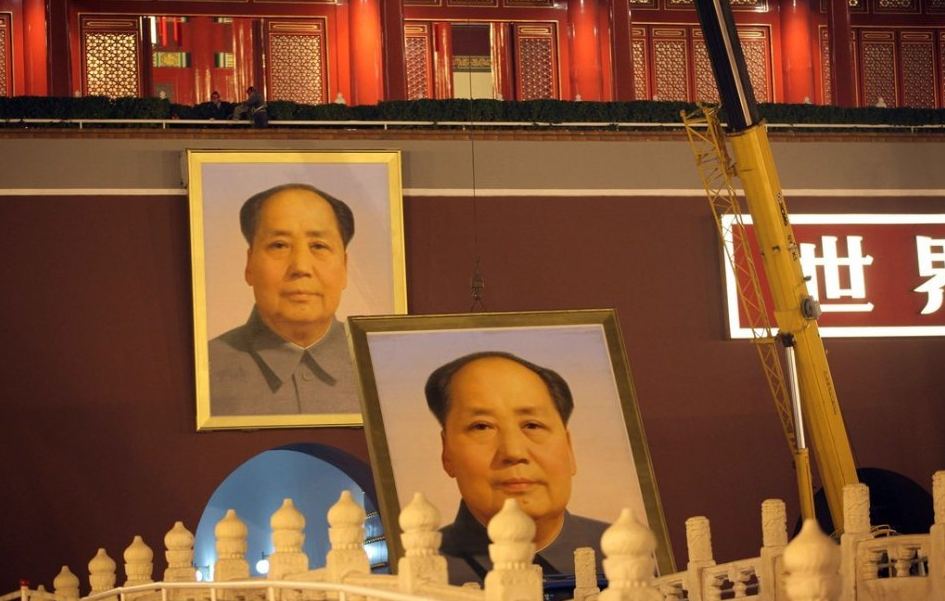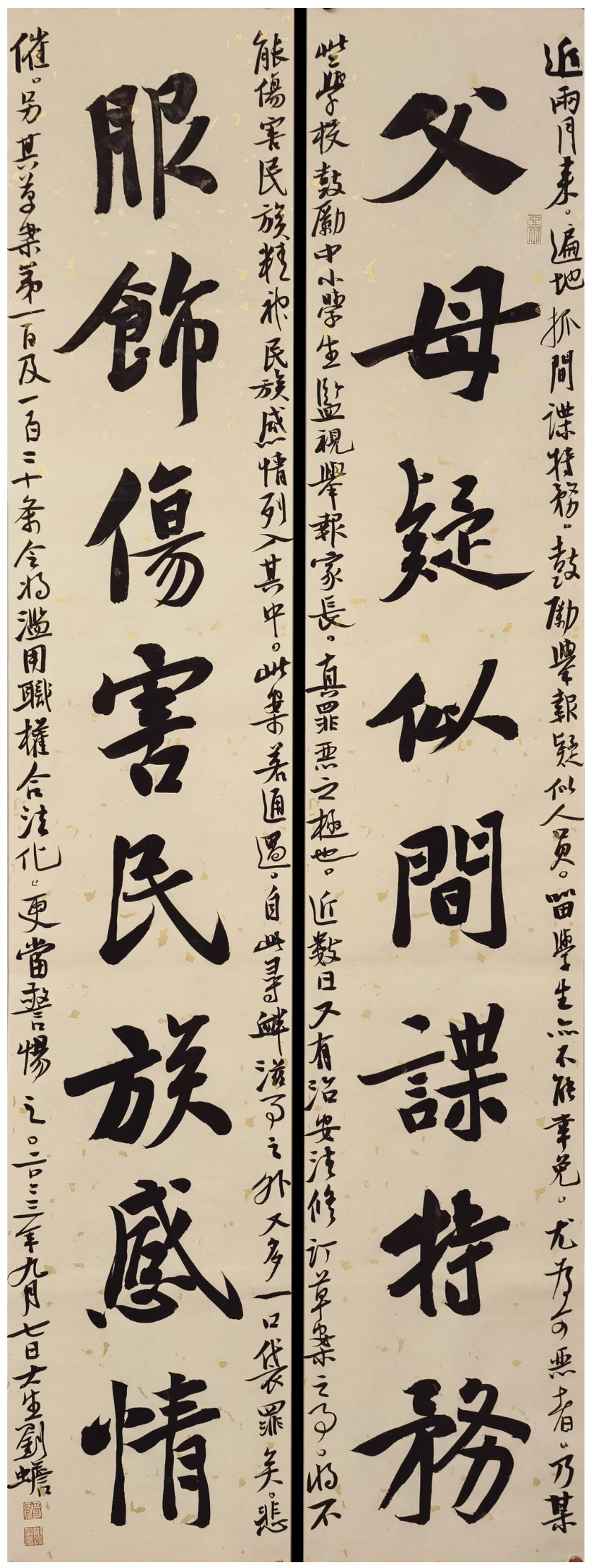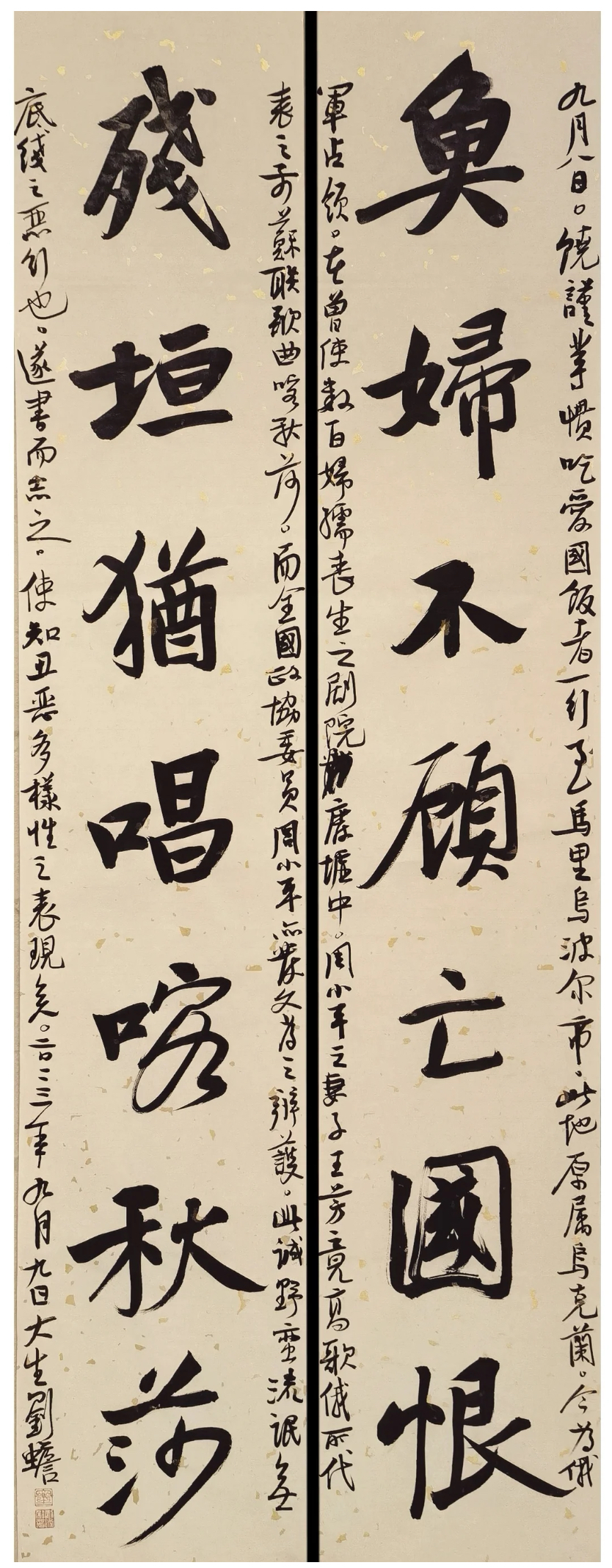Xi Jinping’s Empire of Tedium
陰魂不散
‘At the center of the center of China lies a corpse that nobody dares remove.’
The line rings as true today in 2023, the 47th anniversary of Mao’s death, as it did when Behind the Forbidden Door: Travels in Unknown China, Tiziano Terzani’s colourful account of reporting from China, was published in 1985. It echoed a sentiment shared by many Chinese friends in the early 1980s.
Wu Zuguang (吳祖光, 1917-2003), playwright, film-maker and social critic expressed a similar idea when, over lunch in his Beijing home in the summer of 1980 he told me with considerable relish that only that morning at a meeting with pro-Mao Party elders at the Great Hall of the People he had referred to the deceased Great Helmsman as ‘Bandit Mao’ 毛賊 Máo zéi.
In the 1940s, Zuguang was an enthusiastic supporter of Mao and the Communists and, in late 1945, he was the young editor tasked with publishing ‘Snow’, Mao’s most famous poem, in the Chongqing press. The poem was widely seen as reflecting Mao’s imperial ambitions, something that Zuguang agreed with wholeheartedly (see For Truly Great Men, Look to This Age Alone for the text of the poem and a discussion of its significance).
Over lunch that day, and with his wife Xin Fengxia glaring disapprovingly, Zuguang went on to tell me when addressing the gathering at the Great Hall he had gestured towards Tiananmen Gate and declared unequivocally that as long as Mao’s portrait hung over Tiananmen Square and his embalmed corpse occupied its heart China ‘would never really know peace’ 永無寧日.

A few months earlier, in January 1980, the Sichuan writer Sun Jingxuan 孫靜軒 published a poem in which he had ominously warned that,
A loathsome spectre
Prowls the desolation of our land.
— adapted from The Unbuilt Wall of Sorrow,
China Heritage, Centenary of the Russian Revolution
7 November 2017
In Shades of Mao: the Posthumous Cult of the Great Leader (New York, 1995), my study of the post-1989 popular Mao revival, I observed that ‘Chairman Mao has entered the stream of Chinese history as man, icon, and myth, and there is little doubt that the Cult of the early 1990s is only the first of the revivals he will experience in what promises to be a long and successful posthumous career.’
Mao is the tutelary deity that animates and inspires Xi Jinping’s Empire of Tedium. In it, gestures towards tradition meld with a worldview of unabashed ambition and political hubris. Paranoid, pusillanimous, reactive and vindictive, the Xi-ist Zeitgeist has seen the re-animation of many traits of the Maoist past and po-faced self-righteous high dudgeon cloaks contemporary China.
From 2009, Party leaders promoted the idea that socialist China enjoyed a reputation for its ‘charisma, empathy and influence’ 感召力、親和力、影響力. They did so even as they demonstrated their approach to international affairs at the Copenhagen Climate Summit in December that year. Today, Xi’s China has oodles of rizz, but it’s all in negative territory and Beijing seems smugly satisfied that, for many, it is neither liked nor likeable.
***
China Heritage marks the 47th anniversary of Mao Zedong’s death with two couplets by Liu Chan 劉蟾, a calligrapher, writer and editor based in Beijing. The couplets are accompanied by short commentaries on contemporary affairs which sum up the tenor of the times.
The rubric of Appendix XLIX in our series Xi Jinping’s Empire of Tedium is 陰魂不散 yīn hún bù sàn, ‘haunted by a malign spirit’.
Liu Chan’s work has often featured in The Other China section of this website.
— Geremie R. Barmé
Editor, China Heritage
9 September 2023
47th anniversary of Mao’s death
57th anniversary of the creation of
the Tibetan Autonomous Region
***
Related Material:
- The Curse of Great Leaders — the Xi Jinping decade and beyond, Appendix XIII 罪, Xi Jinping’s Empire of Tedium, 20 July 2022
- A Hosanna for Chairman Mao & Canticles for Party General Secretary Xi, Chapter 20 咒, Xi Jinping’s Empire of Tedium, 22 October 2022
- Ryan Ho Kilpatrick, Positive Energy Gets Positive Reinforcement, China Media Project, 29 August 2023
- 五嶽散人,「精神慰安婦」王芳去給俄爹獻唱是中國政府指使的麼?不是,這是她自己給俄爹「加鐘」、「加項目」,油管,2023年9月9日
-
李承鵬,情感就像內褲,但別穿在外邊,《文學城》,2023年9月8日
- 李北平, 烏克蘭人:王芳在死難者的骨堆上為兇手唱贊歌, VOA, 2023年9月11日
- Ryan Ho Kilpatrick, A Law to Protect China’s Feelings, China Media Project, 14 September 2023
父母疑似間諜特務
服飾傷害民族感情
Ubiquitous suspicions that parents may be spies and agents
And the threat posed by clothes that ‘harm the spirit of the Chinese nation’

***
In recent months, spies and enemy agents have been nabbed throughout the land. People are encouraged to report on suspicious individuals and even foreign students studying in China are victimised. Particularly reprehensible is the fact that some schools encourage primary and hight-school students to keep an eye on their parents and report them if they suspect anything. This is absolutely heinous.
Over the past few days, there has been widespread disquiet over the ‘Draft Revisions to the Law on Penalties for the Administration of Public Security’, the proposals of which include penalties related to such nebulous misdemeanors as ‘undermining the national spirit and hurting the nation’s feelings’. If the revisions are approved, it will create a new and capacious grab-all category of criminality akin to nebulous law related to ‘picking quarrels and provoking trouble’. Tragic! Furthermore, articles 100 and 120 in the draft revisions will legitimate the abuse of power and should be a cause for concern.
— Dasheng Liu Chan, 7 September 2023
近兩月來,遍地抓間諜特務,鼓勵舉報疑似人員,留學生亦不能幸免。尤為可惡者,乃某些學校鼓勵中小學生,監視舉報家長。真罪惡至極也。近數日,又有「治安法修訂草案」之事,將「不能傷害民族精神、民族感情」列入其中。此法案若通過,是「尋釁滋事」之外,又多一口袋罪矣。悲催。又,其草案第100、第120條,會將濫用職權合法化,更當警惕。
2023年9月7日記
[Translator’s Notes:
For some of the concerns raised by legal scholars regarding the draft revisions to the 2012 Law on Penalties for the Administration of Public Security, see 多位法學教授談《治安管理處罰法》(修訂草案)第34條第2、3款, 《鳳凰網》,2023年9月7日;
See also Liu Chan on cultural appropriation:
- Resisting Cultural Capture — Dasheng’s Little Lectures, 18 January 2023;
Li Yuan on the ‘state of warring styles’:
- China May Ban Clothes That Hurt People’s Feelings. People Are Outraged., The New York Times, 11 September 2023;
And, on ‘hurt feelings’ and ‘fragile hearts’, see:
- Namewee 黃明志 et al, ‘The Right to Know & the Need to Lampoon’, 18 October 2021; and,
- Ryan Ho Kilpatrick, A Law to Protect China’s Feelings, China Media Project, 14 September 2023.]
***
Source:
- 劉蟾,父母疑似間諜特務;服飾傷害民族感情 ,Matters,2023年9月8日
魚婦不顧亡國恨
殘垣猶唱喀秋莎
A fishwife oblivious to the agonies suffered by a nation
Sings Katyusha amidst Ukrainian ruins

***
On the 8th of September, Rao Jin and a pack of similar characters who also have their snouts deep in the patriotic trough arrived in Mariupol. Originally Ukrainian territory, the city is now occupied by the Russian army. In the ruins of a drama theatre where hundreds of women and children died during Russian bombardment, Wang Fang, the wife of Zhou Xiaoping (who is known as ‘Beltfish Zhou’) broke out in a lusty rendition of the Soviet song Katyusha. Zhou Xiaoping, who is a member of China’s National People’s Political Consultative Congress wrote something in support of his wife’s act. This is barbarism of such a vile and despicable nature that words simply fail. I have brushed these words to record this event and as a reminder that evil cloaks itself in various disguises.
— Dasheng Liu Chan, 9 September 2023
9月8日,饒瑾等慣吃愛國飯者,一行至馬里烏波爾市。此地原屬烏克蘭,今為俄軍佔領。在曾使數百婦孺喪生之市劇院廢墟中,周小平(周帶魚)之妻王芳,竟高歌俄所代表之前蘇聯歌曲《喀秋莎》。而全國政協委員周小平,亦發文為之辯護。此誠野蠻流氓無底線之惡行也。言語已不足形容。遂書而志之,使知醜惡多樣性之表現矣。
2023年9月9日記
***
[Translator’s Notes:
For a previous comment on ‘Mr Positive Energy’, Zhou Xiaoping / Beltfish Zhou, by Liu Chan, see: Craven, Servile Knaves Hold Office, 7 March 2023.
The expression ‘agonies suffered by a nation’ 亡國恨 wáng guó hèn, literally ‘sorrowful outrage at losing one’s homeland’, comes from a famous line in a poem by Du Mu 杜牧 titled ‘Mooring at Qinhuai’《泊秦淮》. In full, the poem reads:
煙籠寒水月籠沙,夜泊秦淮近酒家。
商女不知亡國恨,隔江猶唱後庭花。
The song Katyusha 《喀秋莎》dates from the Great Patriotic War of the Soviet Union. As Tankman 二大爺, an anti-Communist online influencer based in the United States who was formerly a police officer in Guangdong, pointedly remarked (while blurring some historical details):
Katyusha should properly be regarded as an anti-Chinese song. It was written in 1938 to commemorate a battle fought between the Soviet Army and the Kantō forces of Imperial Japan at Zhanggu Feng in northeast China [or Manchukuo — the Battle of Lake Khasan, also known as the Zhanggufeng Incident]. Having secured a victory, the Russians occupied Zhanggu Feng and subsequently claimed it as Soviet territory. Katyusha, the lyrics of which were written by Mikhail Isakovsky, was composed as part of Soviet propaganda related to that seizure of Chinese territory. One could say that the bravado of the song is a celebration of Chinese loss.
很多人不知道的是,俄國名曲《喀秋莎》其實是百分百的辱華歌曲。這首歌曲是1938年創作的,蘇聯人當時和日本關東軍在東北邊境的中國領土張鼓峰打了一仗,俄國人在獲勝後搶佔張鼓峰,至此張鼓峰淪為俄國領土。俄國官方隨軍宣傳的筆桿子伊薩克夫斯基隨後就創作了這首歌曲。可以說《喀秋莎》的豪情完全是建立在中國領土的淪喪之上。
In the same Tweet, Tankman also observed that:
Wang Fang treats the Russian bandits like her Daddy, singing to them at this place knowing full well that she is triggering Ukraine. It was a dastardly act worthy of nothing but contempt.
Wang Fang, you’re a dumb fuck and you and that pathetic eunuch of a husband of yours should study some history and try to learn how to be decent human beings.
王芳認賊作父,在此為俄國人高歌,公然挑釁烏克蘭,下作至極,令人不齒。…
王芳這個傻逼,你和你的太監老公學點歷史,做個人吧。
At a press conference held in Moscow on 11 September following their visit to occupied Donetsk, Wang Fang and Zhou Xiaoping echoed Russian propaganda: Ukrainian Nazis and NATO bombs were responsible for the damaged theatre in Mariupol and the deaths of innocent civilians.]
***
Source:
- 劉蟾,魚婦不顧亡國恨;殘垣猶唱喀秋莎,Matters,2023年9月9日

